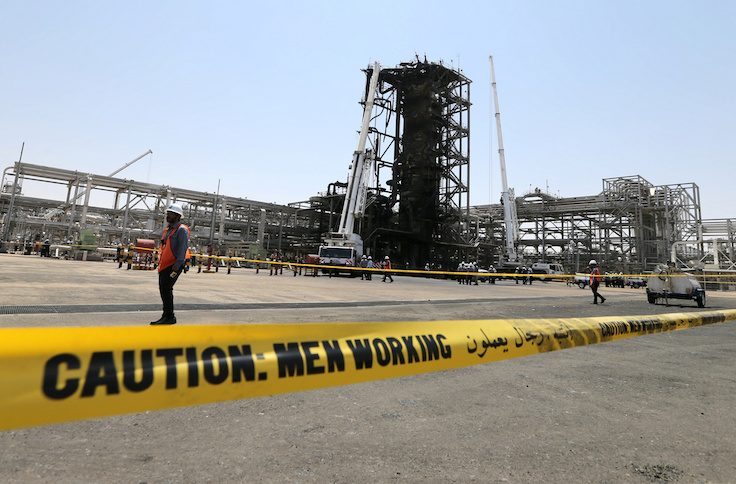By Stephen Kalin and Rania El Gamal
KHURAIS, Saudi Arabia (Reuters) - Saudi Arabia on Friday took media to inspect oil facilities hit by attacks that Washington and Riyadh blame on Iran, showing melted pipes and burnt equipment, as Tehran vowed wide retaliation if heightened tensions boil over into hostilities.
The kingdom sees the Sept. 14 strikes on its Khurais and Abqaiq facilities -- the worst attack on Gulf oil infrastructure since Iraq's Saddam Hussein torched Kuwaiti oilfields in 1991 -- as a test of global will to preserve international order.
Iran denies involvement in the attack, which initially halved oil output from Saudi Arabia, the world's largest petroleum exporter. Responsibility was claimed by Yemen's Houthi movement, an Iran-aligned group fighting a Saudi-led alliance in Yemen's four-year-old conflict.
At Khurais, which the Saudi defense ministry says was hit by four missiles, Reuters reporters were shown repair work under way, with cranes erected around two burnt-out stabilization columns, which form part of oil-gas separation units, and melted pipes.
"We are confident we are going back to the full production we were at before the attack (on Khurais) by the end of September," Fahad Abdulkarim, Aramco's general manager for the southern area oil operation, told reporters.
"We are working 24/7...This is a beehive."
Workmen wearing red high visibility jackets and white helmets moved through the site, a large compound the size of several football stadiums containing interconnected structures of piping and towers.
A mound of blackened debris lay on the ground. An executive said the scorched mess once covered much of the ground but now only a small mound is left.
Some workers sprayed what appeared to be water on the ground. Mobile cranes and water trucks stood near the crumpled, mangled remains of a fire-damaged stabilization tower.
The attacks intensified a years-long struggle between Saudi Arabia and Iran, who are locked in a sometimes violent contest for influence in several flashpoints around the Middle East.
Saudi Minister of State for Foreign Affairs Adel al-Jubeir said on Thursday the attacks were an "extension of the Iranian regime's hostile and outlawed behavior".
Iran has warned U.S. President Donald Trump against being dragged into a war in the Middle East and said it would meet any offensive action with a crushing response.
Tehran amplified that message on Friday when a senior Revolutionary Guards commander said Iran would respond from the Mediterranean to the Indian Ocean against any U.S. plots.
COALITION
"If the Americans think of any plots, the Iranian nation will respond from the Mediterranean, to the Red Sea and to the Indian Ocean," said General Yahya Rahim-Safavi, a senior adviser to Iran's supreme leader, state news agency IRNA reported.
U.S. Secretary of State Mike Pompeo had called the attacks an "act of war" but on Thursday he said Trump, who has ordered more sanctions on Iran, wants a peaceful solution to the crisis.
Iran's foreign minister on Friday questioned Pompeo's remarks and listed repeated Iranian diplomatic initiatives.
"Coalition for Peaceful Resolution?," Mohammad Javad Zarif said on Twitter, and listed eight diplomatic initiatives by Iran since 1985, including a peace plan for Yemen in 2015.
He later said Saudi Arabia and its ally the United Arab Emirates seemed to wish to "fight Iran to the last American".
Oil prices, which soared after the attack, steadied after Riyadh vowed to regain full oil output by the end of September.
Kuwait said it had raised the security alert level at all of its ports, including the oil terminals, state-run media said, citing a decision by the trade and industry minister.
Russian Foreign Minister Sergei Lavrov urged all countries in the Gulf to sit down for talks to defuse tensions and said groundless accusations against Iran over the attacks were inflaming tensions, Interfax news agency reported.
The Yemeni Houthi movement on Friday accused the Saudi-led coalition of a dangerous escalation of the situation around Hodeidah, after coalition forces attacked targets north of the port city.
The actions threatened a U.N.-brokered ceasefire accord in the Red Sea port, Houthi spokesman Mohammed Abdul-Salam said.
(Writing by William Maclean; Editing by Maher Chmaytelli and by Jon Boyle)
